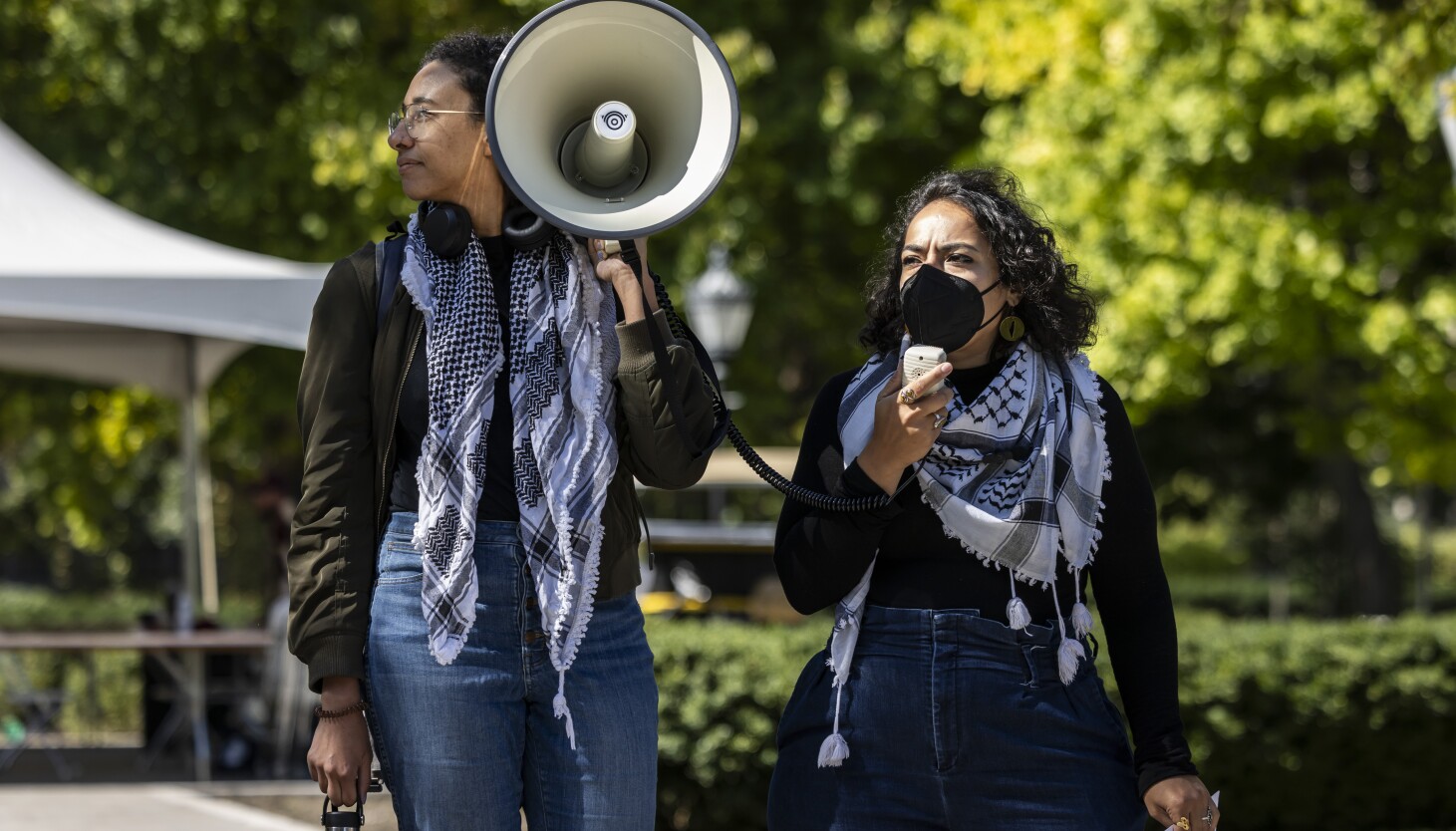Months after pro-Palestinian campus protests and an encampment movement rattled schools across the country last spring, student activists in Chicago say they’re facing new challenges — but don’t plan on letting up.
The nationwide protest movement began in response to the Israeli bombardment of Gaza following the Oct. 7 Hamas attack, which killed 1,200 Israelis. By April, the war had killed more than 30,000 Palestinians, according to the Gaza Health Ministry. The death toll now exceeds 40,000 people.
Students and faculty say their universities haven’t met their demands, including divesting from Israeli arms manufacturers. More recently, several universities have revamped their protest and demonstration policies on campus after many of them, including DePaul University and the University of Chicago, saw days-long encampments that ended with police raids.
For Sarah Wachs, a senior at Northwestern who is active in Jewish Voice for Peace, the university’s new demonstration policy, which limits where, when and how students can protest on campus, raises questions about who decides what free speech is.
“Just having conversations with the students that are in this fight, none of us have gotten a foot in the door,” Wachs said. “They’re creating these new policies without any consideration of those impacted by them.”
Callie Maidhof, a professor of global studies at the University of Chicago, spoke at a teach-in Friday, focusing on the historical context and the longtime persecution of Palestinians. She said it was baffling to reconcile the free speech battles students and faculty were having on campus against the backdrop of the horror in Gaza.
“The fact that we are fighting about free speech, it’s such a ridiculous distraction from the real horrors that are happening,” she said. “But it’s real.”
A spokesperson for the University of Chicago didn’t immediately respond to requests for comment.
In a statement that followed an anonymous $100 million donation to support its Chicago Forum for Free Inquiry and Expression, the university said, “University policies provide extremely wide latitude for protest activity and the expression of a wide range of viewpoints, while noting that it may not disrupt the ordinary activities of the University, harass or threaten others, or prevent others from expressing different views.”
Protesters in the encampment movement hoped to see more progress toward their demands. They succeeded in some ways — Northwestern University President Michael Schill brokered a deal with demonstrators that brought a peaceful end to the encampment there.
But students say they’re still pushing for the same things amid ongoing discrimination. Terrance Freeman, a security guard who worked at DePaul, claimed last month he was reassigned after befriending Palestinian students. Henna Ayesh, a junior at DePaul who is Palestinian, said his absence makes her feel less safe.
“DePaul’s priority is to keep all students safe except when they are Palestinians,” Ayesh said.
A DePaul spokesperson didn’t respond to specific questions about Freeman, but said the school is committed to providing a safe environment for all students.
“We remember and grieve all the innocent lives that have been lost in Israel, Palestine and throughout the region due to the escalation of violence and conflict in the Middle East,” the spokesperson said. “We recognize that many in our university community continue to be deeply affected by this ongoing war and the anguish it has caused.”
Wachs said that, as a Jewish student, she hasn’t felt ostracized within the movement for Palestinian rights, but she has been threatened and called slurs referencing Nazis by people who support Israel. She feels the idea that criticizing Israel’s actions is inherently antisemitic is damaging and scary.
“I think it’s at a point where we’re trying to clarify on campus what antisemitism really looks like,” she said.
Other members of Northwestern’s Jewish community have been wrestling with their own beliefs as the conflict has drawn out deep divides concerning protests, divestment and Jewish identity.
“My belief[s] that Israel has a right to exist, and yet there is vast injustice to Palestinians, [have] always remained pretty steadfast,” Adam Jaffe, a senior at Northwestern, told WBEZ. “And I think sometimes I have felt at odds with both of those parts of myself this past year.”
In a statement, Northwestern said the university’s goal is to protect students of all backgrounds, which was considered when creating the new demonstration policy. The university offered mandatory training on antisemitism and Islamophobia, along with other forms of hate, a spokesperson said.
Now, the conflict is escalating. Lebanon’s state-run National News Agency has reported that some 1,400 Lebanese, including Hezbollah fighters and civilians, have been killed and some 1.2 million driven from their homes in suburban Beirut since Israel escalated its strikes in late September aiming to cripple Hezbollah.
The escalation isn’t a surprise, students say. It just adds a heaviness to the activism they’re committed to continuing.
“If anything, it just has been a bigger motivation for students to keep on going,” said Ayesh, whose grandmother is Lebanese. “But at the same time, for students who do have family in Lebanon, it’s just emotional grief.”
Contributing: AP
